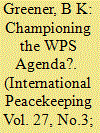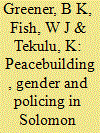|
|
|
Sort Order |
|
|
|
Items / Page
|
|
|
|
|
|
|
| Srl | Item |
| 1 |
ID:
171970


|
|
|
|
|
| Summary/Abstract |
This article draws on official sources to investigate how New Zealand interpreted its Women, Peace and Security obligations through the development and implementation of its first National Action Plan (NAP) in 2015. Existing beliefs that New Zealand was already a ‘world leader’ in this field yielded an unambitious document. Government agencies such as the New Zealand Police (NZ Police) and New Zealand Defence Force (NZDF) have gone on to make some gains under the narrow remit of the NAP, but resourcing and accountability are lacking. Moreover, this focus on perceived existing strengths, and the drawing of objectives from these, meant that New Zealand missed an opportunity to initiate the kind of deeper structural changes initially envisaged by WPS advocates. This article therefore closes with a discussion of how two broader processes – ‘re-gendering’ and ‘de-othering’ – could help New Zealand to better serve the original intent of the WPS agenda.
|
|
|
|
|
|
|
|
|
|
|
|
|
|
|
|
| 2 |
ID:
113816


|
|
|
|
|
| Publication |
2012.
|
| Summary/Abstract |
The idea of creating an international police force (IPF) was first mooted by Lord David Davies in the 1930s. In 1963 U Thant, Secretary General of the United Nations, then claimed that he had 'no doubt that the world should eventually have an international police force'. Yet our international system has been and continues to be based on states, their sovereignty and a correlative 'inside/outside' distinction: a distinction which is resistant to this idea of some form of systematic international policing writ large. Instead of the establishment of an IPF, a new form of international policing has emerged through the unprecedented use of police abroad and the potential consolidation of more specific operational policing norms. This is a phenomenon that may not be as permanent nor as wide ranging as earlier conceptualisations that concerned themselves with a more structured management of interstate behaviour, but, nonetheless, it increases the possibilities for achieving an international order based on the rule of law.
|
|
|
|
|
|
|
|
|
|
|
|
|
|
|
|
| 3 |
ID:
080006


|
|
|
|
|
| Publication |
2007.
|
| Summary/Abstract |
Since the mid-1980s, a number of authors have asserted that there is a special kind of relationship between democratic states; or that liberalism promotes peaceful relations between liberal states; or that there exists a hierarchy of states in international society with liberal states at the apex of that hierarchy. Many of these theories touch on issues of liberalism, liberal states, and the use of military force. Yet they still do not directly address the key question of: when, and for what ends, liberals believe that military force may be used. An implicit intimation is often made that there is a monolithic liberal approach to the use of force. In contrast, this article identifies a variety of contemporary liberal views on this topic and argues that these depend upon the priority given to values such as those of tolerance and consent versus progress and civility, or those of cosmopolitanism versus communitarianism. On this basis, the article examines the liberal options for the use of force that can be justified in different ways by these different values, from self-defense to the creation of liberal entities, depending upon which liberal values predominate
|
|
|
|
|
|
|
|
|
|
|
|
|
|
|
|
| 4 |
ID:
103958


|
|
|
|
|
| Publication |
2011.
|
| Summary/Abstract |
UN Security Council Resolution 1325 calls for a gender perspective to be integrated into the resolution of conflicts. This responsibility manifests itself in a number of more specific proposals, some easily assessable, others less so. In this paper, we begin by considering the success of the Regional Assistance Mission to Solomon Islands (RAMSI) - the poster child for peacebuilding efforts - at meeting these specific proposals. In light of this, we then go on to suggest ways in which RAMSI might meet greater success in fully integrating gender considerations in Solomon Islands by blending sensitivity to gender-based considerations together with a deeper sensitivity to cultural considerations, including cultural understandings of core notions such as 'policing' and 'justice'.
|
|
|
|
|
|
|
|
|
|
|
|
|
|
|
|
| 5 |
ID:
107934


|
|
|
|
|
| Publication |
2011.
|
| Summary/Abstract |
There is a growing body of literature dedicated to critiquing liberal peacebuilding. This paper revisits the current post-conflict peacebuilding agenda in light of these critiques, outlining how both proponents and opponents perceive three core principles, that is, democratisation, economic liberalisation and state-building. Drawing attention to the emergence of arguments for alternative approaches, this paper argues that recent developments provide some hope for reconciling proponents of the liberal agenda with their growing legion of critics.
|
|
|
|
|
|
|
|
|
|
|
|
|
|
|
|
|
|
|
|
|